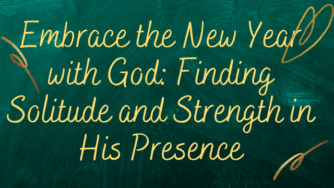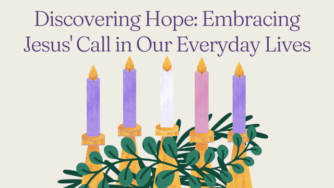Receiving God’s Forgiveness: Embracing Our New Identity in Christ
As we continue our study of Proverbs, we are reminded that wisdom begins with the fear of the Lord. This foundational truth sets the stage for our exploration of forgiveness, a theme that is both profound and transformative. Last week, we delved into the immense spiritual debt we owe and the significance of Jesus paying it all. Jim also covered conflict resolution, emphasizing the importance of addressing disputes in a biblical manner. Today, we transition from understanding the depth of our forgiven debt to exploring the theme of forgiveness itself. We must not settle for false or partial forgiveness. Instead, we will look through Proverbs, Matthew, and 1 Peter to find the two keys to forgiveness and how to apply them in our lives.
Proper Perspective: Forgiveness is More Than What We Think It Is!
Proverbs 25:21-22 (ESV)
“If your enemy is hungry, give him bread to eat, and if he is thirsty, give him water to drink, for you will heap burning coals on his head, and the Lord will reward you.”
While this proverb does not explicitly mention forgiveness, it encourages showing kindness to one’s enemy, which aligns with the spirit of forgiveness. This brings us to the heart of the gospel message: Jesus setting free a sinner and forgiving them all of their debt and wrong. He replaces death with life, debt with freedom, and wrong with righteousness. Bitterness is replaced with forgiveness, the old with the new, and the lost are called. How will we respond?
The Parable of the Unmerciful Servant (Matthew 18:23-35, ESV)
“Therefore the kingdom of heaven may be compared to a king who wished to settle accounts with his servants. When he began to settle, one was brought to him who owed him ten thousand talents. And since he could not pay, his master ordered him to be sold, with his wife and children and all that he had, and payment to be made. So the servant fell on his knees, imploring him, ‘Have patience with me, and I will pay you everything.’ And out of pity for him, the master of that servant released him and forgave him the debt.
But when that same servant went out, he found one of his fellow servants who owed him a hundred denarii, and seizing him, he began to choke him, saying, ‘Pay what you owe.’ So his fellow servant fell down and pleaded with him, ‘Have patience with me, and I will pay you.’ He refused and went and put him in prison until he should pay the debt.
When his fellow servants saw what had taken place, they were greatly distressed, and they went and reported to their master all that had taken place. Then his master summoned him and said to him, ‘You wicked servant! I forgave you all that debt because you pleaded with me. And should not you have had mercy on your fellow servant, as I had mercy on you?’ And in anger his master delivered him to the jailers, until he should pay all his debt. So also my heavenly Father will do to every one of you, if you do not forgive your brother from your heart.”
Key Number One: Perspective
This parable vividly illustrates the importance of perspective in forgiveness. The servant who was forgiven an enormous debt failed to extend the same mercy to his fellow servant who owed him a much smaller amount. This lack of perspective led to his downfall. Similarly, we must recognize the immense debt that Jesus has forgiven us and extend that same forgiveness to others.
Matthew 27:15-26 (ESV)
15 Now at the feast the governor was accustomed to release for the crowd any one prisoner whom they wanted. 16 And they had then a notorious prisoner called Barabbas. 17 So when they had gathered, Pilate said to them, “Whom do you want me to release for you: Barabbas, or Jesus who is called Christ?” 18 For he knew that it was out of envy that they had delivered him up. 19 Besides, while he was sitting on the judgment seat, his wife sent word to him, “Have nothing to do with that righteous man, for I have suffered much because of him today in a dream.” 20 Now the chief priests and the elders persuaded the crowd to ask for Barabbas and destroy Jesus. 21 The governor again said to them, “Which of the two do you want me to release for you?” And they said, “Barabbas.” 22 Pilate said to them, “Then what shall I do with Jesus who is called Christ?” They all said, “Let him be crucified!” 23 And he said, “Why? What evil has he done?” But they shouted all the more, “Let him be crucified!”
24 So when Pilate saw that he was gaining nothing, but rather that a riot was beginning, he took water and washed his hands before the crowd, saying, “I am innocent of this man’s blood; see to it yourselves.” 25 And all the people answered, “His blood be on us and on our children!” 26 Then he released for them Barabbas, and having scourged Jesus, delivered him to be crucified.
This passage highlights the choice given to the crowd between releasing Barabbas, a notorious prisoner, and Jesus, who is called Christ. The crowd, influenced by the chief priests and elders, chose to release Barabbas and demanded the crucifixion of Jesus. This event underscores the profound act of substitutionary atonement, where Jesus took the place of a sinner, symbolized by Barabbas, and ultimately took the place of all sinners on the cross. We are like Barabbas we are set free and forgiven only because of the work of Jesus Christ!
Luke 23:34 (ESV)
34 And Jesus said, “Father, forgive them, for they know not what they do.” And they cast lots to divide his garments.
This powerful statement of forgiveness occurs while Jesus is being crucified. Despite the immense suffering He is enduring, Jesus intercedes for those who are crucifying Him, demonstrating the depth of His love and mercy. This act of forgiveness serves as a profound example for all believers, illustrating the importance of forgiving others, even in the most difficult circumstances.
God’s Wisdom in Forgiveness
Proverbs 19:11 (ESV)
“Good sense makes one slow to anger, and it is his glory to overlook an offense.”
God’s wisdom and patience in us lead to forgiveness. Our forgiveness should reflect God’s forgiveness of our great debt. This is important! It comes from God’s power, not our own. When we understand that our ability to forgive is rooted in God’s strength and wisdom, we can begin to forgive others as He has forgiven us.
Our Response: Key Number Two: Living to Our True/Real Identity
We are offered a new identity in Christ. Will we take it and live by it?
“Having purified your souls by your obedience to the truth for a sincere brotherly love, love one another earnestly from a pure heart, since you have been born again, not of perishable seed but of imperishable, through the living and abiding word of God.”1 Peter 1:22
Our new nature enables us to consider others above ourselves, which is the other key to forgiveness. When we love one another earnestly from a pure heart, we reflect the love and forgiveness that God has shown us. This love serves as a powerful witness to the world.
Love as a Witness to the World (John 13:35">John 13:35, ESV)
“By this all people will know that you are my disciples, if you have love for one another.”
Once we have the right mindset, forgiving others becomes far easier. But what about when we wrong others?
Practical Steps to Forgiveness
Proverbs 28:13 (ESV)
“Whoever conceals his transgressions will not prosper, but he who confesses and forsakes them will obtain mercy.”
This proverb underscores the importance of confession and repentance, which are integral to the process of forgiveness. Christians are called to forgive others whether or not forgiveness is sought. This means that we must be proactive in seeking forgiveness and extending it to others.
The Foundational Truth – Our Identity in the Gospel
1 Peter 1:3-4 (ESV)
“Blessed be the God and Father of our Lord Jesus Christ! According to his great mercy, he has caused us to be born again to a living hope through the resurrection of Jesus Christ from the dead, to an inheritance that is imperishable, undefiled, and unfading, kept in heaven for you.”
The central truth of our amazing salvation is that we are born again, which means we have a new identity. This transformation is profound:
- Slave to Royal Heir, Ambassador
- Dead to Alive
- Abandoned and Orphaned to Child of the King
- Insecure, Confused Identity, Longing for Acceptance to Inestimable Significance, and Purpose with Assured Security and Love Without End
- Enemy of God to Beloved Friend
- No Heritage or Belonging to the People of God with a Destiny Beyond Imagination
- Deceived Self-Rule to Acceptance of the Lord’s Sovereignty
Being born again is more than just adding something to our lives. It is a complete transformation:
- More than Fire Insurance – Avoiding Hell
- More than Joining the Club – the Moral Social Club
- More than the Fulfillment of All My Desires, or the Answer to My Problems
It is a shift from consumer Christianity to enlistment in the service of the King. It is a living hope, not the futility of living for ourselves and this life alone. We experience Christ in and with us now and throughout eternity, with an inheritance kept in heaven for us.
Living According to Our New Identity
The rest of 1 Peter elaborates on living according to our new identity, but we will concentrate on 1 Peter 1:13-2:12">1 Peter 1:13-2:12.
1 Peter 1:13-2:12 (ESV)
“Therefore, preparing your minds for action, and being sober-minded, set your hope fully on the grace that will be brought to you at the revelation of Jesus Christ. As obedient children, do not be conformed to the passions of your former ignorance, but as he who called you is holy, you also be holy in all your conduct, since it is written, ‘You shall be holy, for I am holy.'”
- Prepared for Action: Consciously and intentionally living for our Father and King as Lord of our lives – It’s suiting up daily.
- Obedient Children: Obedience of children is a normal and reasonable expectation, and the reverse is perverse. Continued obedience is an expression of trust and respect.
- Holy: Exclusively dedicated to the service and worship of God. Holiness is more than moral purity; it is being devoted to a specific purpose and nothing else (Exodus 30:22-32 – anointing for consecration). It is a debt of gratitude and response to God’s rightful redemptive claim (1 Peter 1:17-19). We have no right to self-determination.
- Love One Another Earnestly: Our born-again nature allows us to consider one another above ourselves. Love for one another is our witness to the world (John 13:35).
An Identity and Purpose Bigger than Ourselves
1 Peter 2:9-12 (ESV)
“But you are a chosen race, a royal priesthood, a holy nation, a people for his own possession, that you may proclaim the excellencies of him who called you out of darkness into his marvelous light. Once you were not a people, but now you are God’s people; once you had not received mercy, but now you have received mercy. Beloved, I urge you as sojourners and exiles to abstain from the passions of the flesh, which wage war against your soul. Keep your conduct among the Gentiles honorable, so that when they speak against you as evildoers, they may see your good deeds and glorify God on the day of visitation.”
That Unbelievers May See Your Good Works and Glorify God
A Royal Priesthood
A Holy Nation
A People for His Own Possession: “I will be their God and they will be my people.”
Sojourners – Not Residents – We’re Passing Through
Proclaim the Excellencies of Him Who Called Us Out of Darkness
Practical Steps to Forgiveness
Proverbs 28:13 (ESV)
“Whoever conceals his transgressions will not prosper, but he who confesses and forsakes them will obtain mercy.”
This proverb underscores the importance of confession and repentance, which are integral to the process of forgiveness. Christians are called to forgive others whether or not forgiveness is sought. This means that we must be proactive in seeking forgiveness and extending it to others.
In summary, forgiveness is far more than we think. The two keys to forgiving well are to have a proper perspective and to live according to our real identity in Christ. God’s provision and example enable us to forgive. Living out forgiveness aligns with our new identity and purpose in Christ.
Importance of the Church
The church plays a crucial role in fostering a community of forgiveness and love. It is within the church that we can practice and experience the transformative power of forgiveness. By living out our faith through forgiveness and love, we become a powerful witness to the world.
Invitation
If you have not yet accepted Jesus’ role as your Savior, I invite you to do so today. Embrace the forgiveness and new identity that He offers. For those who have already accepted Christ, I encourage you to reflect on your own forgiveness and extend it to others. Remember the importance of living out your faith through forgiveness and love.
Prayer
Heavenly Father, thank you for the incredible gift of forgiveness. Help us to understand and embrace the forgiveness we’ve received through Jesus. Give us the strength and courage to forgive those who have wronged us and to seek forgiveness from those we’ve wronged. May we live out our new identity in Christ, reflecting your love and mercy in all we do. In Jesus’ name, we pray. Amen.
Expanding on Key Points
The Depth of Our Forgiven Debt
Understanding the depth of our forgiven debt is crucial to grasping the significance of forgiveness. In the parable of the unmerciful servant, the servant owed ten thousand talents, an astronomical amount that he could never repay. This represents our own spiritual debt, which is so immense that we could never repay it on our own. Jesus, in His infinite mercy, forgave us this debt by sacrificing Himself on the cross. This act of forgiveness is the foundation of our faith and should inspire us to forgive others.
False or Partial Forgiveness
We must not settle for false or partial forgiveness. True forgiveness involves letting go of the hurt and resentment and extending genuine love and mercy to the offender. False forgiveness, on the other hand, may involve saying the words “I forgive you” without truly meaning it or holding onto a grudge. Partial forgiveness may involve forgiving some offenses but not others. Both false and partial forgiveness fall short of the complete and unconditional forgiveness that God has shown us.
The Role of Kindness in Forgiveness
Proverbs 25:21-22 encourages us to show kindness to our enemies by giving them food and drink. This act of kindness can soften hearts and pave the way for forgiveness. When we show kindness to those who have wronged us, we reflect God’s love and mercy. This can lead to reconciliation and healing in relationships.
The Power of Perspective
Having the right perspective is essential to forgiveness. When we recognize the immense debt that we have been forgiven, it becomes easier to forgive others. The parable of the unmerciful servant illustrates the importance of perspective. The servant who was forgiven a massive debt failed to extend the same mercy to his fellow servant who owed him a much smaller amount. This lack of perspective led to his downfall. Similarly, we must keep in mind the great forgiveness we have received and extend that same forgiveness to others.
Living According to Our New Identity
Our new identity in Christ empowers us to forgive. As 1 Peter 1:22-23 reminds us, we have been born again of imperishable seed through the living and abiding word of God. This new nature enables us to love one another earnestly from a pure heart. When we live according to our new identity, we reflect God’s love and forgiveness to the world.
Confession and Repentance
Proverbs 28:13 highlights the importance of confession and repentance in the process of forgiveness. Concealing our transgressions leads to a lack of prosperity, while confessing and forsaking them leads to mercy. As Christians, we are called to confess our sins to one another and seek forgiveness. This act of humility and repentance is essential to experiencing true forgiveness and healing in our relationships.
Practical Application
Forgiving Others
- Reflect on God’s Forgiveness: Take time to meditate on the immense debt that God has forgiven you. This will help you gain the proper perspective and make it easier to forgive others.
- Pray for Strength: Ask God for the strength and courage to forgive those who have wronged you. Remember that forgiveness comes from God’s power, not your own.
- Show Kindness: Follow the advice of Proverbs 25:21-22 and show kindness to your enemies. This act of love can soften hearts and pave the way for forgiveness.
- Confess and Repent: If you have wronged someone, confess your transgressions and seek their forgiveness. This act of humility and repentance is essential to experiencing true forgiveness.
Seeking Forgiveness
- Acknowledge Your Wrongdoing: Take responsibility for your actions and acknowledge the hurt you have caused.
- Apologize Sincerely: Offer a genuine apology to the person you have wronged. Be specific about what you are sorry for and express your regret.
- Make Amends: Take steps to make things right. This may involve repairing any damage you have caused or offering restitution.
- Seek God’s Forgiveness: Pray for God’s forgiveness and ask Him to help you change your ways.
Conclusion
Forgiveness is a powerful and transformative act that reflects God’s love and mercy. By understanding the depth of our forgiven debt and living according to our new identity in Christ, we can extend genuine forgiveness to others. This not only brings healing and reconciliation to our relationships but also serves as a powerful witness to the world. Let us embrace the forgiveness we have received and extend it to others, living out our faith through love and mercy.
Final Prayer
Heavenly Father, thank you for the incredible gift of forgiveness. Help us to understand and embrace the forgiveness we’ve received through Jesus. Give us the strength and courage to forgive those who have wronged us and to seek forgiveness from those we’ve wronged. May we live out our new identity in Christ, reflecting your love and mercy in all we do. In Jesus’ name, we pray. Amen.
By embracing these principles and living out forgiveness in our daily lives, we can experience the transformative power of God’s love and mercy. Let us commit to forgiving others as we have been forgiven and living out our new identity in Christ.








